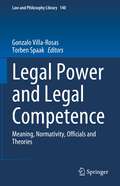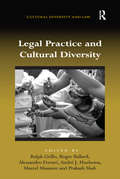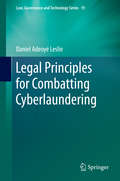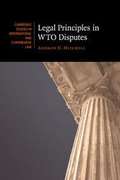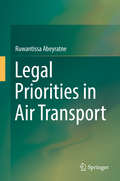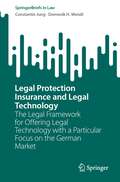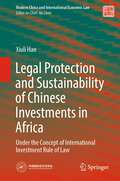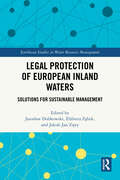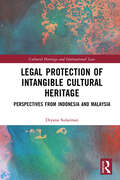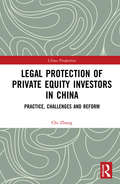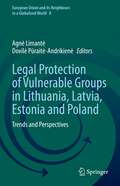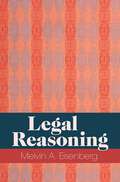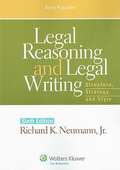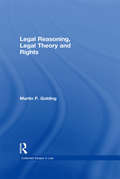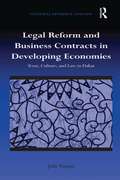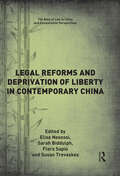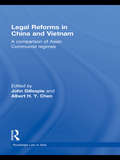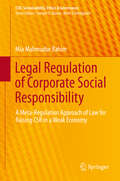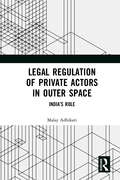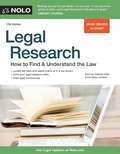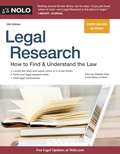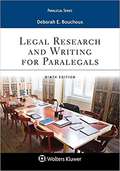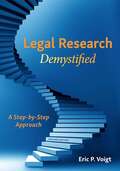- Table View
- List View
Legal Power and Legal Competence: Meaning, Normativity, Officials and Theories (Law and Philosophy Library #140)
by Torben Spaak Gonzalo Villa-RosasThis volume explores the concepts of legal power and legal competence in fourteen original, cutting-edge chapters by leading legal theorists. Legal power and legal competence are major topics in jurisprudence, as they concern a range of practices, common to all modern legal systems, that empower individuals to bring about changes in the respective system by changing their own legal position or the legal positions of others. This compilation covers five broad themes. The chapters in the first section address open questions on the meaning of legal power and legal competence, while those in the second tackle problems regarding their normativity. The third section is devoted to specifically exploring the relationship between legal power and constitutive norms. The fourth focuses on the analysis of legal officials and legal offices, while the fifth and final section assesses various theories of legal power and legal competence.
Legal Practice and Cultural Diversity (Cultural Diversity and Law)
by Ralph Grillo, Roger Ballard, Alessandro Ferrari, André J. Hoekema, Marcel Maussen and Prakash ShahLegal Practice and Cultural Diversity considers how contemporary cultural and religious diversity challenges legal practice, how legal practice responds to that challenge, and how practice is changing in the encounter with the cultural diversity occasioned by large-scale, post-war immigration. Locating actual practices and interpretations which occur in jurisprudence and in public discussion, this volume examines how the wider environment shapes legal processes and is in turn shaped by them. In so doing, the work foregrounds a number of themes principally relating to changing norms and practices and sensitivity to cultural and religious difference in the application of the law. Comparative in approach, this study places particular cases in their widest context, taking into account international and transnational influences on the way in which actors, legal and other, respond.
Legal Principles for Combatting Cyberlaundering
by Daniel Adeoyé LeslieThis volume deals with the very novel issue of cyber laundering. The book investigates the problem of cyber laundering legally and sets out why it is of a grave legal concern locally and internationally. The book looks at the current state of laws and how they do not fully come to grips with the problem. As a growing practice in these modern times, and manifesting through technological innovations, cyber laundering is the birth child of money laundering and cybercrime. It concerns how the internet is used for 'washing' illicit proceeds of crime. In addition to exploring the meaning and ambits of the problem with concrete real-life examples, more importantly, a substantial part of the work innovates ways in which the dilemma can be curbed legally. This volume delves into a very grey area of law, daring a yet unthreaded territory and scouring undiscovered paths where money laundering, cybercrime, information technology and international law converge. In addition to unearthing such complexity, the hallmark of this book is in the innovative solutions and dynamic remedies it postulates.
Legal Principles in WTO Disputes
by Andrew D. MitchellPrinciples play a crucial role in any dispute settlement system, and the World Trade Organization (WTO) is no exception. However, WTO Panels and the Appellate Body have been too timid in using principles, sometimes avoiding their use when appropriate and at other times using them without fully acknowledging that they are doing so. Perhaps more worryingly, these bodies often fail to delve deeply enough into principles. They tend to overlook key questions such as the legal basis for using a given principle, whether the principle is being used in an interpretative manner or as applicable law, and the meaning of the principle in public international law. This book establishes a framework for addressing these questions. The use of such a framework should allay fears and misconceptions about the use of principles and ensure that they are used in a justifiable manner, improving the quality of dispute settlement in the WTO.
Legal Priorities in Air Transport
by Ruwantissa AbeyratneAgainst the backdrop of enormous technological strides, this book argues that the air transport industry must be constantly vigilant in its efforts to employ a legal regime that is applicable to the aeronautical and human aspects of the carriage by air of persons and goods. In this regard, safety and security are of the utmost importance, both in terms of safe air navigation and the preservation of human life. Although the International Civil Aviation Organization (ICAO) addresses legal issues through its Legal Committee, many emerging issues that urgently require attention lie outside the Committee’s purview. This book analyzes in detail the items being considered by ICAO’s Legal Committee, considers the legal nature of ICAO, and discusses whether or not ICAO’s scope should be extended. Since the limited issues currently addressed by ICAO do not reflect the rapidly changing realities of air transport, the book also covers a broad range of key issues outside the parameters set by ICAO, such as: the need to teach air law to a new generation of aviation professionals; combating cyber-crime and cyber-terrorism; the regulation of artificial intelligence; traveller identification; interference with air navigation; human trafficking; unruly passengers; climate change; air carrier liability for passenger death or injury; Remotely Piloted Aircraft Systems (drones); and the cabin crew and their legal implications.
Legal Protection Insurance and Legal Technology: The Legal Framework for Offering Legal Technology with a Particular Focus on the German Market (SpringerBriefs in Law)
by Domenik H. Wendt Constantin JungThis book addresses the legal protection insurance market and continues the collection and analysis of data carried out by Legal Protection International aisbl (at the time, the International Association of Legal Protection Insurance) in recent years. Its first part covers the fundamentals of and recent advances in the legal protection insurance market, while the second presents a study on the relevant legal framework for offering Legal Technology services as a legal protection insurer in Germany. In this context, the study also defines the term “Legal Technology”, categorises Legal Technology services (“application-oriented categorisation”), analyses the relevant European legal framework and highlights the connections to the upcoming European Artificial Intelligence Act.
Legal Protection and Sustainability of Chinese Investments in Africa: Under the Concept of International Investment Rule of Law (Modern China and International Economic Law)
by Xiuli HanThis book attempts to illustrate the whole picture of international investment rule of law between China and African countries and find the way forward through combining theory and practice. It is a book by a Chinese professor based on her long-term research experience in the international investment law field and her African field work in person. Its main feature is its well-balanced thinking on the structure of investment international rule of law. It should be the most comprehensive research on the international investment rule of law between China and African countries. With the increase of Chinese investment in Africa, various discussions and viewpoints on Chinese investment in Africa have become striking. The purpose of this book is to explore systematically the protection and sustainability of Chinese investment under the concept and framework of the international investment rule of law, so as to serve the sustainable development of Africa and China. For the purpose of this book, great importance is attached to the idea of the international rule of law, and the international investment law with the function of rule of law is adhered to. The conclusion of this book is that China should take proactive steps to protect Chinese investment in Africa and regulate Chinese overseas investors and their investments in addition to complying with the laws in the host states and thus make them conductive to African and Chinese sustainable development; however, the most significant issue is that China-Africa investment relations should be regulated by the evolving and specific international investment rule of law, and the China-Africa international investment rule of law should conform to normative in form, support common sustainable development in value, and reflect the social reality of China and Africa. For both researchers and students, it is an approach to understand international investment rule of law from a perspective of China and Africa. For those who are interested in China and Africa, it is a useful reference book.
Legal Protection of European Inland Waters: Solutions for Sustainable Management (Earthscan Studies in Water Resource Management)
by Jarosław Dobkowski Elżbieta Zębek Jakub Jan ZiętyThis book examines the legal protection and management of inland waters in Europe.With inland waters facing a range of significant threats, including from climate change, pollution, and overexploitation, this volume discusses legal solutions for protecting and managing these inland waters. It presents comparative studies from a range of European countries, including the Czech Republic, Germany, France, Lithuania, Poland, and Spain, with each chapter examining the legal status and legal instruments being implemented in each country, allowing for easy cross-comparison. Topics covered include surface water management and protection, water quality and monitoring, management of hazardous substances, and crisis management. Through these unique comparative studies, the volume highlights legal solutions which can be adopted by other nations and used as models for wider implementation across Europe. In doing so, this book offers important recommendations for changing water law to ensure a water secure future in Europe.This book will be of great interest to students and scholars of water law, water resource management, environmental policy, and environmental conservation.
Legal Protection of Intangible Cultural Heritage: Perspectives from Indonesia and Malaysia (Routledge Studies in Cultural Heritage and International Law)
by Diyana SulaimanThe book examines whether the protection of Intangible Cultural Heritage (ICH) by Indonesia and Malaysia upheld the interests of the various communities from which the cultural heritage originates, and whether the laws recognise that cultural heritage is often shared with other states and communities.The legal classifications of various indigenous communities and the interpretations of ‘indigeneity’ in the two countries have presented problems in the context of ICH protection. The state is regarded as holding the intellectual property rights for some forms of ICH and this also posed problems in the implementation of the laws to protect the communities’ ICH. This book employs a community-based perspective and adopts a multidisciplinary approach in exploring questions of the rights to and benefits of heritage.This book will be useful for students, academics and policy makers with an interest in international law, heritage and intellectual property rights.
Legal Protection of Private Equity Investors in China: Practice, Challenges and Reform (China Perspectives)
by Chi ZhangThis monograph aims to provide an in-depth analysis of the legal protection of the private equity (PE) investors in China. In an academic sense, this research mainly focuses on the agency problems in the life cycle of PE investment under the business organization law system in China. Briefly speaking, the agency problems of PE investment derive from the two-level separation of ownership and control, one of which is the principal–agent relationship between the PE investors and the fund manager, and the other is the principal–agent relationship between the PE shareholders and the management of investee companies. It is the first research to provide an in-depth examination on the investor protection in the PE investment under the business organization law system in China.
Legal Protection of Vulnerable Groups in Lithuania, Latvia, Estonia and Poland: Trends and Perspectives (European Union and its Neighbours in a Globalized World #8)
by Agnė Limantė Dovilė Pūraitė-AndrikienėThis book analyses the current legal situation and protection of vulnerable groups in Lithuania, Latvia, Estonia and Poland. In recent decades, national legislation in many European states has especially focused on vulnerable groups with the aim of securing their enhanced protection and social inclusion. This trend is also noticeable in North-Eastern Europe, where the legal frameworks are constantly being revised to address the needs of vulnerable parts of society, including women, children, the elderly, people with disabilities, and minorities, as well as prisoners and victims of crime. But despite these positive changes, many challenges persist. In this book, the authors provide a comprehensive, comparative analysis of legal regulations and practices intended to protect vulnerable groups in Lithuania, Latvia, Estonia and Poland, and in the process, share insights into the current situation and trends in this often-overlooked region. Part I introduces readers to the topic by defining the concept of vulnerable groups and elaborating on its understanding in the European and national contexts. Part II analyses the legal protection of groups characterised by inherent and/or circumstantial vulnerability, while Part III addresses specific crime-related vulnerability issues in the target region. In closing, Part IV puts the spotlight on three specific vulnerable groups in the discussed countries.
Legal Publishing in Antebellum America
by M. H. HoeflichLegal Publishing in Antebellum America presents a history of the law book publishing and distribution industry in the United States. Part business history, part legal history, part history of information diffusion, M. H. Hoeflich shows how various developments in printing and bookbinding, the introduction of railroads, and the expansion of mail service contributed to the growth of the industry from an essentially local industry to a national industry. Furthermore, the book ties the spread of a particular approach to law, that is, the "scientific approach," championed by Northeastern American jurists to the growth of law publishing and law book selling and shows that the two were critically intertwined.
Legal Reason
by Weinreb Lloyd L.Legal Reason describes and explains the process of analogical reasoning, which is the distinctive feature of legal argument. It challenges the prevailing view, urged by Edward Levi, Cass Sunstein, Richard Posner and others, which regards analogical reasoning as logically flawed or as a defective form of deductive reasoning. It shows that analogical reasoning in the law is the same as the reasoning used by all of us routinely in everyday life and that it is a valid form of reasoning derived from the innate human capacity to recognize the general in the particular, on which thought itself depends. The use of analogical reasoning is dictated by the nature of law, which requires the application of rules to particular facts. Written for scholars as well as students and persons generally who are interested in law, Legal Reason is written in clear, accessible prose, with many examples drawn from the law and from everyday experience.
Legal Reasoning
by Melvin A. EisenbergThe common law, which is made by courts, consists of rules that govern relations between individuals, such as torts (the law of private wrongs) and contracts. Legal Reasoning explains and analyzes the modes of reasoning utilized by the courts in making and applying common law rules. These modes include reasoning from binding precedents (prior cases that are binding on the deciding court); reasoning from authoritative although not binding sources, such as leading treatises; reasoning from analogy; reasoning from propositions of morality, policy, and experience; making exceptions; drawing distinctions; and overruling. The book further examines and explains the roles of logic, deduction, and good judgment in legal reasoning. With accessible prose and full descriptions of illustrative cases, this book is a valuable resource for anyone who wishes to get a hands-on grasp of legal reasoning.
Legal Reasoning and Legal Writing: Structure, Strategy, and Style (6th edition)
by Richard K. NeumannThe Sixth Edition of this respected and popular text remains grounded in the premise that legal reasoning and legal writing are best learned when they are taught together. Building on that foundation, Neumann continues to offer complete, clear, and timely coverage of how to form a legal argument and how to write an effective legal memorandum. Streamlined in its Sixth Edition, Legal Reasoning and Legal Writing features: comprehensive coverage of legal writing: the office memo; the motion memo; the appellate brief; eminently readable text, including an exceptionally lucid explanation of the reasoning behind the proof of a conclusion of law; a thoughtful treatment of all aspects of legal reasoning; student-friendly instruction on the process of writing, the mechanics of style, and grammar up-to-date examples and exercises; sample documents in the Appendices, including an office memo, motion memo, and two appellate briefs. Highly regarded author Richard K. Neumann, Jr. presents, in tandem, smart, in-depth coverage of legal writing and legal reasoning, supported by examples, writing samples, and extraordinarily clear and lucid exposition.
Legal Reasoning, Legal Theory and Rights (Collected Essays In Law Ser.)
by MartinP. GoldingThis book is a selection of articles and chapters published over Martin Golding's academic career. Golding's approach to the philosophy of law is that it contains conceptual and normative issues and in this volume logical issues in legal reasoning are examined, and various theories of law are critically discussed. Normative questions are dealt with regarding the rule of law and criminal law defenses, and the concept of rights and the terminology of rights are analyzed. Much of Golding's work is critical-historical as well as constructive. This volume will prove an informative and useful collection for scholars and students of the philosophy of law.
Legal Reform and Business Contracts in Developing Economies: Trust, Culture, and Law in Dakar (Cultural Diversity and Law)
by Julie PaquinThis book examines the prospects for business law reform to drive economic development in developing countries. It argues that, despite statements to the contrary, cultural factors and other local conditions in developing countries are not properly taken into account in current business law reform programs. Utilizing the city of Dakar as an example, this book investigates the consequences of this lack of fit between local needs and transplanted legal models by examining the potential and actual impact of the OHADA program of law reform on local business practices. Focusing on how managers make decisions and apply appropriate norms in routine business operations, the book documents how contractual disputes arise and are solved in Dakar and the role played by formal law in these processes. By examining imported law from the point of view of the end-users of legal reforms, the book reveals the complex relationship between formal law, local cultural norms and the activities of SMEs operating in developing economies, and calls for a reconsideration of current law and development theory as well as the role of contract law in business decisions. It will be relevant to all developing countries seeking to align their laws with ’best practice’ as identified by aid institutions.
Legal Reforms and Deprivation of Liberty in Contemporary China (The Rule of Law in China and Comparative Perspectives)
by Susan Trevaskes Flora Sapio Sarah Biddulph Elisa NesossiThe volume presents an extensive investigation into the process of reforms of detention powers in today’s China and offers an in-depth analysis of the debates surrounding the reformist attempts. The chapters in this collection demonstrate that legislative and institutional reforms in this area result from political opportunities - openings and tensions at the central institutional levels of political authority - and contingent social and political factors. The book examines legal and institutional reforms to institutions of detention and imprisonment that have occurred since the 1990s, with a particular focus on the 21st century. Its content follows three particular lines of enquiry concerning the issue of deprivation of liberty in contemporary China. The first deals with the academic and theoretical debates on the subject of imprisonment and detention. The related chapters explain the difficulties encountered in this area of research and understandings of the discourses of reform through labour in Western and Chinese scholarship. The second deals with the specific issues of criminal and administrative forms of deprivation of liberty, examining in particular the institutional and legislative dimensions, considering the relationship between reforms and criminal justice policy agendas. The third assesses the meaning of institutional reforms in the context of the changing state-society relationship in contemporary China.
Legal Reforms in China and Vietnam: A Comparison of Asian Communist Regimes (Routledge Law in Asia)
by John Gillespie Albert H.Y. ChenAlthough the adoption of market reforms has been a key factor leading to China’s recent economic growth, China continues to be governed by a communist party and has a socialist-influenced legal system. Vietnam, starting later, also with a socialist-influenced legal system, has followed a similar reform path, and other countries too are now looking towards China and Vietnam as models for development. This book provides a comprehensive, comparative assessment of legal developments in China and Vietnam, examining similarities and differences, and raising important questions such as: Is there a distinctive Chinese model, and/or a more general East Asian Model? If so, can it be flexibly applied to social and economic conditions in different countries? If it cannot be applied to a culturally and politically similar country like Vietnam, is the model transportable elsewhere in the world? Combining ‘micro’ or interpretive methods with ‘macro’ or structural traditions, the book provides a nuanced account of legal reforms in China and Vietnam, highlighting the factors likely to promote, change or resist the spread of the Chinese model.
Legal Regulation of Corporate Social Responsibility
by Mia Mahmudur RahimEven though Corporate Social Responsibility (CSR) has become a widely accepted concept promoted by different stakeholders, business corporations' internal strategies, known as corporate self-regulation in most of the weak economies, respond poorly to this responsibility. Major laws relating to corporate regulation and responsibilities of these economies do not possess adequate ongoing influence to insist on corporate self-regulation to create a socially responsible corporate culture. This book describes how the laws relating to CSR could contribute to the inclusion of CSR principles at the core of the corporate self-regulation of these economies in general, without being intrusive in normal business practice. It formulates a meta-regulation approach to law, particularly by converging patterns of private ordering and state control in contemporary corporate law from the perspective of a weak economy. It proposes that this approach is suitable for alleviating regulators' limited access to information and expertise, inherent limitations of prescriptive rules, ensuring corporate commitment, and enhance the self-regulatory capacity of companies. This book describes various meta-regulation strategies for laws to link social values to economic incentives and disincentives, and to indirectly influence companies to incorporate CSR principles at the core of their self-regulation strategies. It investigates this phenomenon using Bangladesh as a case study.
Legal Regulation of Private Actors in Outer Space: India’s Role
by Malay AdhikariThe book addresses legal issues and challenges in using Space Technology. Especially covered are the provisions of International Space Law and few national space legislations to regulate private actors in outer space. The key chapters covered are history of space regulations, private actors in space, legal issues for such actors, regulating these issues outside India, and the same in India. In concluding chapter, the author has worked out some recommendations.The book would be of immense use to people especially startups in private space industry; students, faculties and scholars of Space Law and Policy, Space Security, Defence and Security Studies.Please note: Taylor & Francis does not sell or distribute the Hardback in India, Pakistan, Nepal, Bhutan, Bangladesh and Sri Lanka
Legal Research
by Stephen Elias Editors Of NoloIf you're searching for information in a real or virtual law library as a paralegal, law student, legal assistant, journalist, or lay person, finding and accessing the laws that you need to read can be a challenge. Turn to Legal Research, which outlines a systematic method to find answers and get results. In plain, readable English, Attorney Stephen Elias explains, with plenty of examples and instructions, how to: read and understand statutes, regulations and cases evaluate cases for their value as precedent use all the basic tools of legal research practice what you've learned with "hands-on, feet-in" library exercises, as well as hypothetical research problems and solutions This easy-to-use and understand book has been adopted as a text in many law schools and paralegal programs. This edition has been condensed to be more readable and includes an expanded discussion on the use of legal research tools on the web.
Legal Research
by Stephen EliasLegal research made simple! If you're searching for information in a real or virtual law library as a paralegal, law student, legal assistant, journalist, or lay person, finding and accessing the laws that you need to read can be a challenge. Turn to Legal Research, which outlines a systematic method to find answers and get results. In plain, readable English, Attorney Stephen Elias explains, with plenty of examples and instructions, how to: read and understand statues, regulations and cases evaluate cases for their value as precedent use all the basic tools of legal research practice what you've learned with "hands-on, library exercises, as well as hypothetical research problems and solutions This easy-to-use and understand book has been adopted as a text in many law schools and paralegal programs. This edition has been condensed to be more readable and includes an expanded discussion on the use of new legal research tools on the web.
Legal Research And Writing For Paralegals
by Deborah E. BouchouxLegal Research and Writing for Paralegals emphasizes the skills and issues that paralegals encounter in practice. Thoroughly up-to-date, the Ninth Edition continues to combine clear text with visual aids, writing samples, tips, and pointers. Designed specifically for paralegal students, Deborah Bouchoux s classroom-tested approach teaches cutting-edge research skills, writing style, and proper citation form to equip students with an essential skill set and well-founded confidence. <p><p> The author's logical and comprehensive approach enhances students understanding. Part I covers Primary Authorities, Part II discusses Secondary Authorities, and Part III covers the basics of Legal Writing. In addition, Bouchoux integrates writing strategies into each research chapter to demonstrate the link between the two processes. Thorough coverage of electronic research includes chapters on both internet research and fee-based services. Bouchoux thoroughly explains proper citation form and the process of updating/validating legal authorities. The Legal Writing section includes samples of legal writing, such as letters, a court brief, and a legal memorandum.
Legal Research Demystified: A Step-by-Step Approach
by Eric P. VoigtLegal Research Demystified offers a real-world approach to legal research. The textbook guides law students through eight steps to research common law issues and ten steps to research statutory issues. These research steps are demonstrated through many hypotheticals and visual aids. Students have praised the textbook for its screen captures, checklists, and descriptive charts, such as charts demonstrating Boolean searching and comparing features of citators. Professors have appreciated that the book educates students on how to do legal research instead of discussing finding tools and resources in a vacuum.
